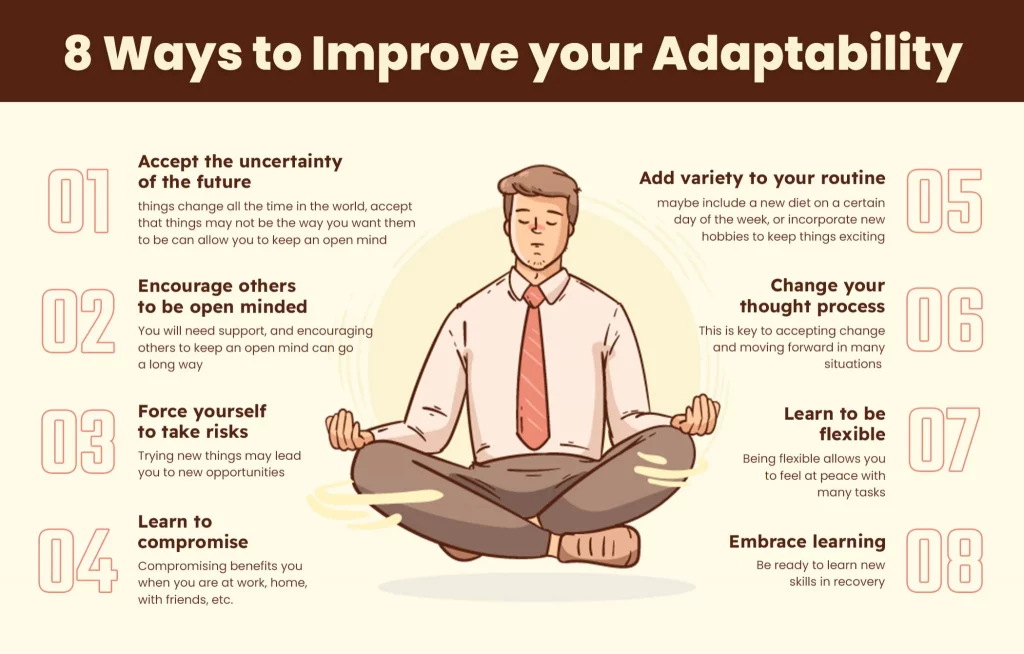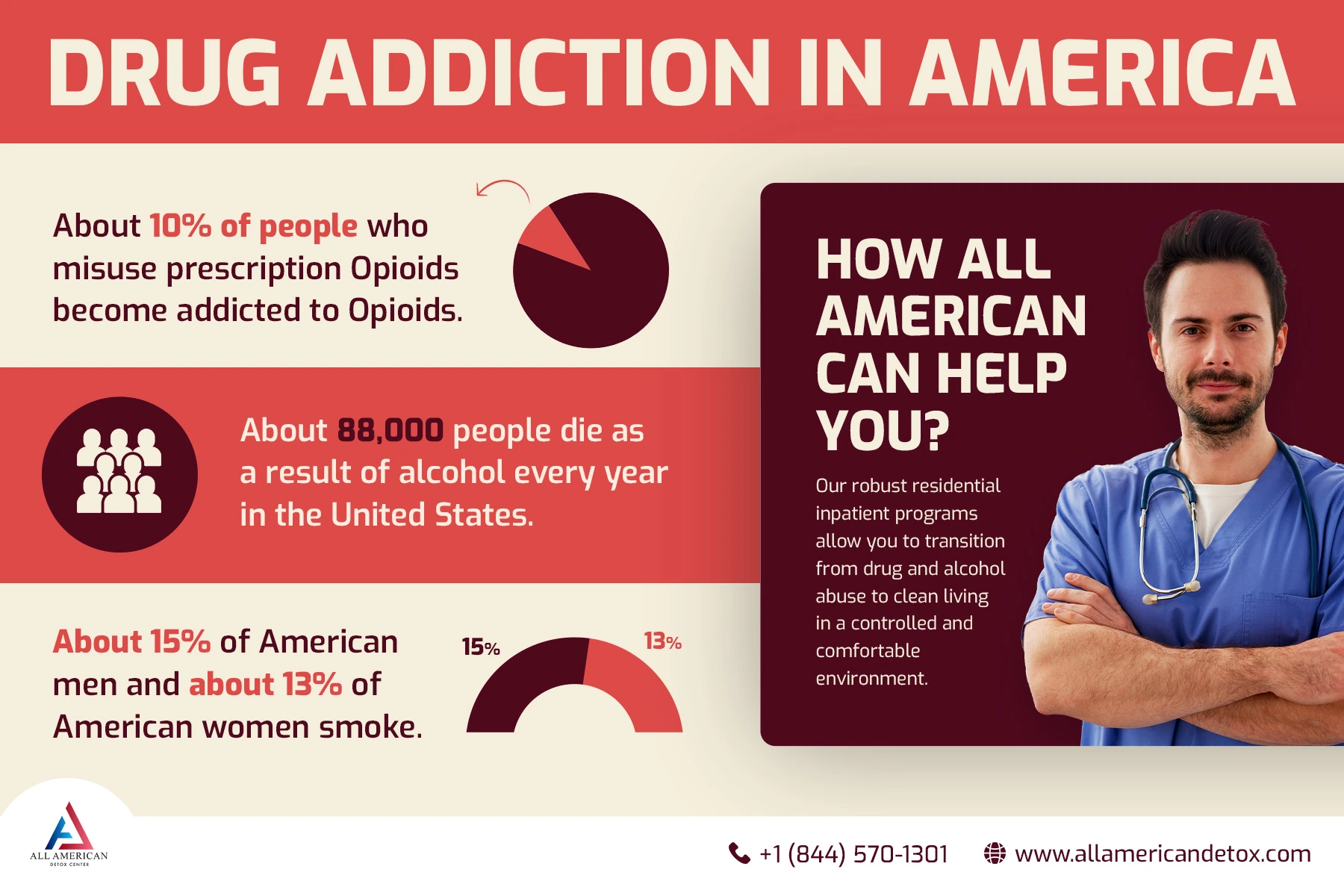Making the choice to enter treatment for substance addiction requires an immense amount of change. Transitioning to sobriety includes changes to your way of life for example the way you think and the way you cope. Learning adaptability skills is a great tool for your recovery. The importance of adaptability in addiction recovery is necessary and can help boost your confidence as well. In many cases, we think of change in a negative manner, and we may try to avoid it in any way it comes to us because we are afraid of what that change may bring us whether it be a good or bad change.
We all have the strength within to create change and already have adapted to so many things over the course of generations. Think of all the things you have adapted to in your daily life and know that adaptability in addiction recovery is absolutely possible with strength, courage, and support.
If you are struggling with substance abuse and are ready to learn new adaptability skills, All American Detox Center is the solution for you.
All American Detox is a drug rehab center in Los Angeles that provides you with personalized treatment plans and luxury residential inpatient treatment.
Importance of Adaptability in Addiction Treatment Recovery
What is Adaptability?
Adaptability is the capacity for an individual to cope, recover, and take advantage of the change that may disrupt the individual’s daily life. Substance addiction comes with many disruptions to an individual’s daily life including work, school, and family.
Adaptability is a very essential skill to develop when in recovery because it allows you to see the many possibilities and opportunities there are that come with first, getting sober, and second, accepting change.
The importance of creating change in addiction recovery can literally change your life for the better, and if you may be nervous just think about all the times you have accepted change or adapted to a new lifestyle. One example of adaptability that has affected societies globally is the covid 19 pandemic. Individuals have had to accept these unanticipated changes in their daily life such as working from home, having online school, losing loved ones, and postponing important events.
If we as a society can adapt to a global pandemic, you too can learn adaptability skills and learn to grow in recovery.
What is Addiction?
When we think of addiction, we may think of individuals who are weak and only care for themselves. We may see them as criminals, dangerous, or annoying to society. This kind of thinking upholds the stigmatization of drugs and may actually cause more harm than good.
Addiction is a chronic disease in the brain and many individuals who abuse drugs or alcohol are trying to escape the pain. For example, the emotional and psychological pain of losing a parent or the physical pain of a traumatic injury.
What are the signs of addiction? Below is a list of some of the signs and symptoms of drug addiction that may be preventing someone from changing their ways.
- Problems at work, home, or school such as being late, not showing up, or being unable to perform normal work duties
- Loss of energy of motivation
- Neglecting one’s appearance
- Spending a lot of money on the substance
- Experiencing withdrawal from the substance
- Lying about using the substance
- Stealing to get money for the substance
Is addiction controlling your life? If so, it may be time to think about entering a drug alcohol rehab center. The importance of being willing to change in addiction treatment will provide you with so many positive benefits by the end of your stay.
8 Ways to Improve your Adaptability Skills in Addiction Treatment
How can we create adaptability within ourselves? How to improve your adaptability skills in addiction treatment recovery?
An important tip to remember when creating space for change is to take things slow as to not overwhelm yourself and know that adaptability and change will benefit you greatly in your long-term recovery.
Here are 8 ways you can improve your adaptability skills in addiction recovery:
- Accept the uncertainty of the future – things change all the time in the world, accept that things may not be the way you want them to be can allow you to keep an open mind
- Encourage others to be open-minded – you will need support, and encouraging others to keep an open mind can go a long way
- Force yourself to take risks – trying new things may lead you to new opportunities
- Learn to compromise – compromising benefits you when you are at work, home, with friends, etc.
- Add variety to your routine – maybe include a new diet on a certain day of the week, or incorporate new hobbies to keep things exciting
- Change your thought process – this is key to accepting change and moving forward in many situations
- Learn to be flexible – being flexible allows you to feel at peace with many tasks
- Embrace learning – be ready to learn new skills in recovery
A big factor in learning adaptability is changing your mindset and adopting new healthier ways of thinking which will largely benefit you in recovery. Keeping your old mindsets may lead to relapse.
Conclusion
These lifestyle adjustments are necessary to lead a healthy life and allow us to learn, grow and overcome. Entering treatment may feel scary because of the changes that will occur, but you must trust the process and accept that uncertainty and you will come out of treatment feeling refreshed and ready to conquer the world.
Are You Ready For Addiction Treatment?
This drug detox center in Los Angeles is currently accepting new patients and when you enter, you will be talked through the detoxification process and what comes after. When entering treatment, just remember how many positive benefits come with this big change.
Visit All American Detox at their website Alcohol Rehab Center, or call them now at (844) 570-1301.





